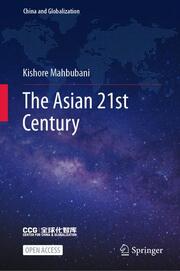-
Zusatztext
-
This open access book consists of essays written by Kishore Mahbubani to explore the challenges and dilemmas faced by the West and Asia in an increasingly interdependent world village and intensifying geopolitical situation. The contents cover four parts: Part One The End of the Era of Western Domination. The major strategic error that the West is now making is to refuse to accept this reality. The West needs to learn how to act strategically in a world where they are no longer the number 1. Part Two The Return of Asia. From the years 1 to 1820, the largest economies in the world were Asian. After 1820 and the rise of the West, however, great Asian civilizations like China and India were dominated and humiliated. The twenty-first century will see the return of Asia to the center of the world stage. Part Three The Peaceful Rise of China. The shift in the balance of power to the East has been most pronounced in the rise of China. While this rise has been peaceful, many in the West have responded with considerable concern over the influence China will have on the world order. Part Four Globalization, Multilateralism and Cooperation. Many of the world's pressing issues, such as COVID-19 and climate change, are global issues and will require global cooperation to deal with. In short, human being now lives in a global village. States must work with each other, and we need a world order that enables and facilitates cooperation in our global village.
-
-
Kurztext
-
This open access book consists of essays written by Kishore Mahbubani to explore the challenges and dilemmas faced by the West and Asia in an increasingly interdependent world village and intensifying geopolitical competition. The contents cover four parts: Part One The End of the Era of Western Domination. The major strategic error that the West is now making is to refuse to accept this reality. The West needs to learn how to act strategically in a world where they are no longer the number 1. Part Two The Return of Asia. From the years 1 to 1820, the largest economies in the world were Asian. After 1820 and the rise of the West, however, great Asian civilizations like China and India were dominated and humiliated. The twenty-first century will see the return of Asia to the center of the world stage. Part Three The Peaceful Rise of China. The shift in the balance of power to the East has been most pronounced in the rise of China. While this rise has been peaceful, many in the West have responded with considerable concern over the influence China will have on the world order. Part Four Globalization, Multilateralism and Cooperation. Many of the world's pressing issues, such as COVID-19 and climate change, are global issues and will require global cooperation to deal with. In short, human beings now live in a global village. States must work with each other, and we need a world order that enables and facilitates cooperation in our global village.
-
-
Autorenportrait
- A veteran diplomat, student of philosophy, and author of nine books, Kishore Mahbubani is currently a Distinguished Fellow at the Asia Research Institute, National University of Singapore. Mahbubani is also a former President of the UN Security Council (Jan 2001, May 2002) and the Founding Dean of the Lee Kuan Yew School of Public Policy (2004-2017). Mahbubani writes and speaks prolifically on the rise of Asia, geopolitics and global governance. His nine books and articles in the New York Times, Washington Post, Financial Times and Foreign Affairs have earned him global recognition as "the muse of the Asian century." He was inducted into the American Academy of Arts and Sciences in 2019
Detailansicht
The Asian 21st Century
China and Globalization
ISBN/EAN: 9789811668104
Umbreit-Nr.: 2834597
Sprache:
Englisch
Umfang: vii, 270 S., 1 s/w Illustr., 2 farbige Illustr., 2
Format in cm:
Einband:
gebundenes Buch
Erschienen am 30.12.2021
Auflage: 1/2022


